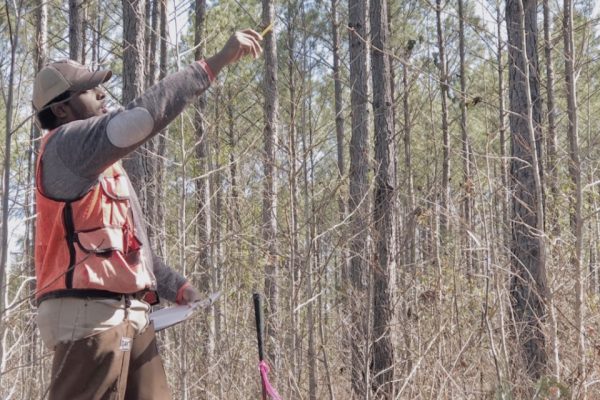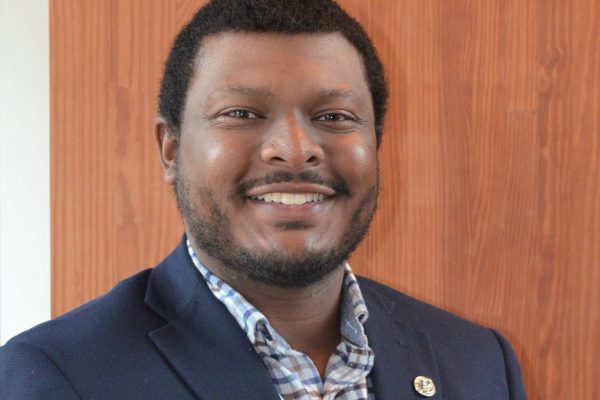Involvement within the School of Forestry and Wildlife Sciences student organizations provides opportunity for students to exercise leadership skills, build relationships with their classmates, and foster community between students and professionals in the varying occupations associated with forestry, wildlife and natural resources. In his own words, learn how Dickerson’s participation has positively impacted his student experience:
Major: Forestry
Expected Graduation: Spring 2020
Involvement: Forest, Environment and Wildlife Leadership (FEWL) Academy, Forestry Club
What led you to choose this major?
I grew up in the agricultural industry; my family raised cattle and I was initially drawn to working in that field, but I learned about forestry because my friend’s father, Trip Winters, is a forester at Coastal Forest Products of Chapman, Alabama. Seeing that he was able to make a career out of his love for the outdoors made me curious about forestry, so I decided to do some background research on the procurement aspect of the field.
Why did you decide to attend Auburn University?
I have always been infatuated with Auburn, ever since I was a kid. I always knew that it was the school I wanted to go to; I love the culture, the football team. So, I knew that I would attend Auburn and I knew because of my family’s involvement with agriculture that it was a prestigious school for that field, and once I decided to pursue forestry I saw that Auburn was very well recognized for its programs in this field as well.
What is your favorite part about being a student in the School of Forestry and Wildlife Sciences?
My favorite part about being a student of this school is being able to meet and connect with the people in the forestry industry; it has a kind of family feel, it’s very close knit. Auburn has set up their forestry program so that upcoming juniors go to the Solon Dixon Forestry Education Center in Andalusia, Alabama, for eight weeks of the summer for our procurement practicum where we learn about the process of buying timber, inventory and estimates, types of products that can be harvested from tracks, and the eventual delivery of the timber to mills. In those eight weeks you’re living with your classmates so you form a really close bond with them and that bond continues to strengthen; throughout our careers we’re gonna be friends and colleagues and I think that’s really special.
Describe a class that you have taken as Forestry major that has left an impact on you.
Dr. Gallagher’s harvesting course has been the most intriguing to me because of my particular interest in that aspect of forestry. Currently, forestry in the private sector, taught by Mr. Paul Schrantz and Dr. Gallagher, has been really beneficial to me as it brings in industry individuals who tell their story and explain where they came from, how they have progressed in the field, what they are passionate about, and what they think is important for the modern forester to know in order to be successful. Those narratives really bring everything full circle because you are able to see where these professionals started and what path of forestry they took in their careers.
What opportunities within the school have helped ensure your academic success?
The faculty really goes the extra mile to prepare us to succeed in our careers with the knowledge they depart to us and really emphasize the importance of representing ourselves and Auburn with integrity. This can be especially seen in the creation of the Forest, Environment and Wildlife Leadership, or FEWL, Academy by Dean Alavalapati and Dr. Adam Maggard. Being a member of that allowed me to meet policy makers and government officials in both Alabama and Washington D.C. Those opportunities and the leadership skills that we learned showed me how to aptly apply my knowledge in the classroom and in the industry.
If you are involved in a student organization within the school, describe the group’s purpose and why being a member is important to you.
The Forestry Club gives a broader understanding of the field and stresses the importance of being stewards of the land. I believe that it gives students a sense of purpose through outreach and networking. We do an annual fundraiser called Log a Load for Kids that raises money in support of the Children’s Miracle Network of Alabama. Considering networking, the club brings in industry individuals that give an overview of their company for prospective employees and interviews are held the next day and this process of being able to meet the representative before applying often leads to students earning internships and jobs. I think that opportunity is very beneficial for forestry students beginning their careers.
What are you doing right now as a student that is giving you supplemental experience in your desired field?
As a senior in forestry, I am completing my senior project which entails a team of forestry students working together to act as a consultant to a private land owner. We visit the property, find out the client’s objectives, and from that we apply the knowledge gained from our four years of studies to create and carry out a detailed management plan for the private land owner. This project provides a bridge from being a student to being a working member of the industry, and you can even put the consulting experience on your resume.
What are your career plans after graduation?
I have been hired by Weyerhaeuser where I’ll start off as a resource forester. From there I have aspirations of becoming a harvest manager which would include working with loggers to cut timber and then organizing the transportation of the timber to mills.
What are you passionate about? How does SFWS allow you to pursue those passions?
I am passionate about sustainability and stewardship of the land. I feel that forestry can have a negative reputation to the public because of misinformation. Because I am an active member of clubs and am able to take on leadership roles within the school, I am allowed a platform where I can inform others about what forestry is, what we do as foresters, and how the practices that we utilize are sustainable. We want this resource to be around not only for our use but for the use and enjoyment of future generations.
What advice would you give to upcoming SFWS freshmen?
Learn as much as you can about forestry so that you can find what interests you the most and become well rounded in the field so that you know the ins and outs of the industry. Forestry can be very specific but knowing the roles of corresponding positions will help you succeed in the field.
(Written by Avanelle Elmore)











